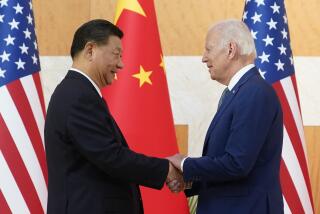Poor U.S. Communications Seen in China Dinner Flap
- Share via
WASHINGTON — Poor communications within the Administration contributed to the embarrassing incident in which a Chinese dissident displeased authorities by trying to attend an American dinner to which he was invited in Beijing with President Bush and top Chinese leaders, a senior U.S. official conceded Thursday.
The Administration official, noting that the issue has “turned out to be extraordinarily sensitive to the Chinese,” said the President knew a week before the event that astrophysicist Fang Lizhi had been invited to a diplomatic dinner last Sunday night to which President Yang Shangkun and Premier Li Peng were also invited.
Bush was told of the Fang invitation--which was not his idea but was proposed when the U.S. Embassy staff in China drew up the guest list--at a meeting he had with academic experts and Administration officials at a Camp David, Md., in preparation for his visit to China.
But at that time, although the Chinese already had raised objections to Fang’s invitation, the White House was not told that there was a potential for a serious diplomatic incident, the official said, adding, “Communications in Washington were less than perfect.”
While other Chinese who have opposed their government’s policies were allowed to attend the event, Chinese officials prevented Fang from reaching the dinner at a hotel in Beijing on the second night of the President’s two-day visit to the Chinese capital. The incident overshadowed much of the President’s stay in China, where he is considered an “old friend” because of his service there in 1974 and 1975 as head of the U.S. Liaison Office.
The incident has proved to be an embarrassment to the Administration, which has been reluctant to criticize Beijing’s handling of human rights issues and which faces its next foreign policy challenge Tuesday when Secretary of State James A. Baker III meets in Vienna with Soviet Foreign Minister Eduard A. Shevardnadze.
The Vienna meeting primarily will be one to “get acquainted,” and any move to set dates or sites for a summit conference this year between Bush and Soviet President Mikhail S. Gorbachev “would be premature,” the official said, insisting on speaking anonymously.
Chinese Increased Criticism
Meantime, the Chinese, clearly annoyed by the Fang invitation, escalated their criticism of the United States on Wednesday.
A Foreign Ministry spokesman described as irresponsible the “U.S. official remarks” about the incident and expressed surprise and “deep regret,” the New China News Agency said. The Chinese statement referred to comments made a day earlier by White House Press Secretary Marlin Fitzwater, who noted that the invitation of Fang, China’s most prominent advocate of democracy, had been intended to make a human rights statement.
While Bush “expressed his regret” over the incident as he bade farewell in Beijing to Vice Premier Wu Xueqian, officials took pains not to draw attention to the matter. Fitzwater said then that Bush “believes quiet diplomacy is the appropriate course for raising the human rights issue in China.”
But the new Administration has been criticized for not being more forceful in publicly making known its objections to the treatment of Fang. A former Reagan Administration official, speaking privately, said, “We always pull our punches with the Chinese on human rights, which undermines our credibility with other countries.”
‘Took a Triple Hit’
In the Fang incident, he said, the President “took a triple hit on this one: The Chinese dumped on him; the domestic constituency wasn’t happy, and Fang Lizhi dumped on him, too.”
In an unusual press conference at the White House press room--set up in a Beijing hotel for the President’s visit--Fang suggested that Bush adhered to a “double standard” by speaking critically about human rights violations in the Soviet Union but not in China.
But the senior Administration official defended the President’s handling of sensitive human rights issues in China, drawing attention, for example, to Bush’s reference to human rights in a toast he made while attending a banquet given by the Chinese.
More to Read
Sign up for Essential California
The most important California stories and recommendations in your inbox every morning.
You may occasionally receive promotional content from the Los Angeles Times.













